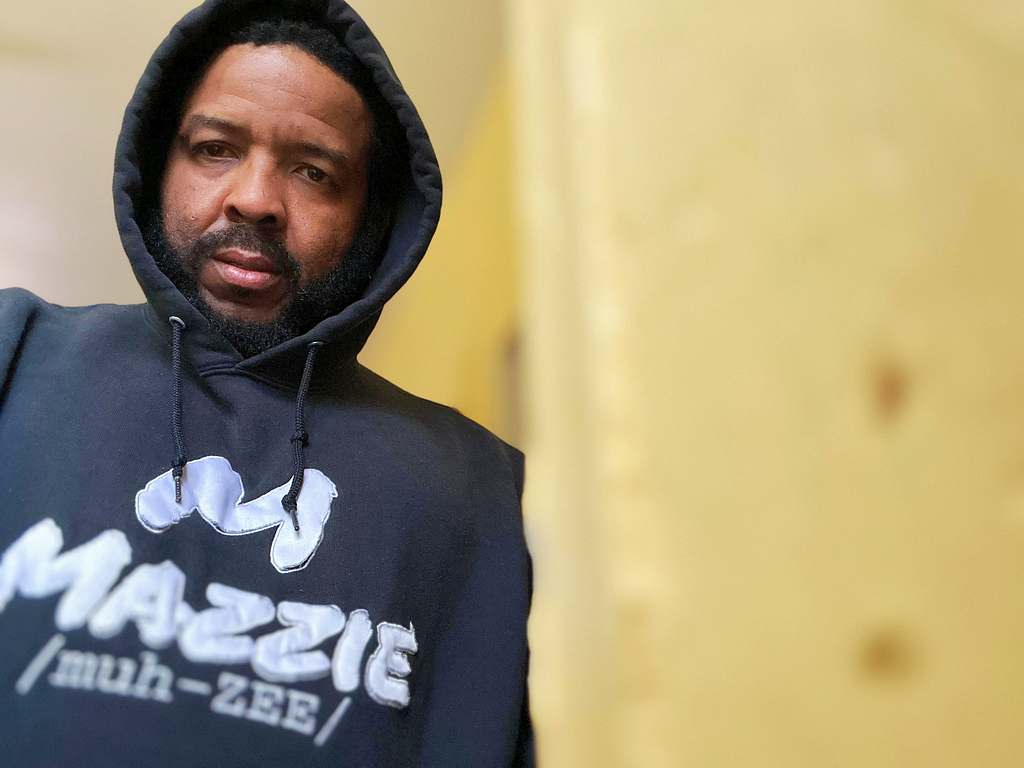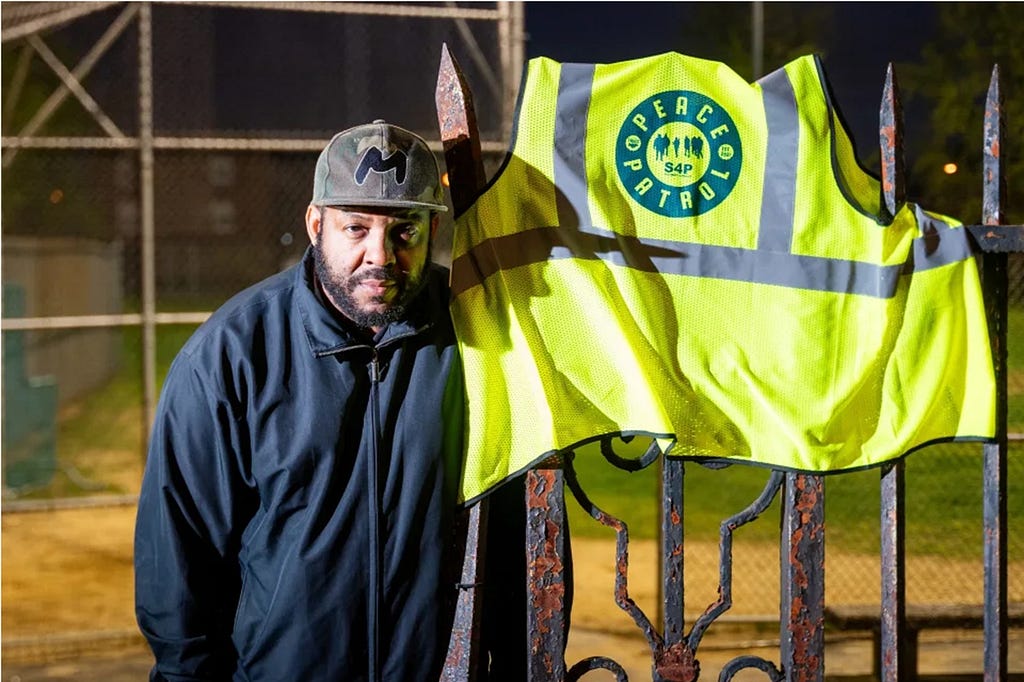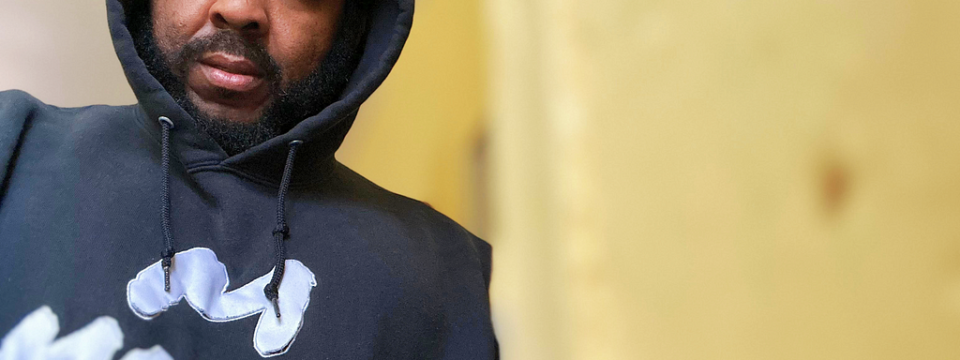
If I had to narrow it down to one thing most probable to address my most pressing concerns, it would be a truth and reconciliation movement in America to address the white supremacist colonial capitalist creed that undergirds our nation’s oldest institutions and processes and necessarily undermines what America professes to be.
Asa part of our series about stars who are making an important social impact, I had the pleasure of interviewing Mazzie Casher.
Philly native Mazzie Casher has a storied history of representing the soul and spirit of everyday Philadelphians. His artistic journey began as a member of NAME, a Philadelphia Hip-Hop ensemble consisting of theater director Ozzie Jones, and DJ/Producer/Sound Designer Larry “Mr. Cisum’’ Fowler. Beginning in 1998, Mazzie embarked on a solo career under the pseudonym Grand Agent, touring North America and the world with the likes of legendary Hip-Hop pioneers Poor Righteous Teachers, Common, Large Professor, Camp Lo and other legendary acts. Some of these he has also recorded with including Grand Puba, Souls of Mischief and Pete Rock. He began spending more time in Philly late in 2020 when the number of homicides on the books were nearing the mid 400’s. When he ran into his lifelong friend and high school classmate Steve Pickens, one thing led to another and Philly Truce was born.
Thank you so much for joining us on this interview series. Can you share with us the backstory that led you to this career path?
The path to co-founding PHILLY TRUCE began in 1982, most likely when I heard “The Message” by Grandmaster Flash & The Furious Five oozing out of the boombox of an older neighborhood kid in the Logan section of Philadelphia. In 1986 I made my first attempt to harness the power of recorded message when I laid my first verses over a Steady B instrumental. In 1994, I co-founded NAME, a Hip-Hop trio that achieved cult status in the Hip-Hop folklore of what The Legendary Roots dubbed: Illadelph Halflife. In 1998 as NAME was peaking, I was becoming Grand Agent, the solo rapper who released an album called By Design in 2001, that facilitated an exile from the United States that could not have been better timed. When 9/11 happened, I was living in Europe decompressing from America and recording my second solo album. Over the next decade, I returned to the States, lived in NY, Philly (again) and ultimately settled in LA where I began to take an interest in harnessing the power of recorded visuals. After the better part of a decade on the West Coast, I returned home…almost. It would be 2020 before I seriously entertained the possibility of returning to Philadelphia as a resident. It ultimately happened on the heels of a run-in with a high school classmate, former roommate and brother-in-law. Those three descriptors refer to one guy. His heart was heavy with the knowledge that Philadelphia would likely eclipse 500 homicides as 2020 wound down. It was October when we ran into each other. I recalled the first time Philly had hit 500 murders. We were in 10th grade and it was 30 years ago. By May of 2021 we were launching PHILLY TRUCE APP, which spawned two other programs PEACE PATROL and SAFE CITY SOLUTIONS that have since eclipsed the app and all the media attention the novelty of that idea brought. We still use local news as our primary marketing tool and that’s only because the only training I ever received in forming and running an organization came through the learning curve of promoting myself as a rapper. It all comes down to harnessing the power of a message.
It has been said that our mistakes can be our greatest teachers. Can you share a story about the funniest mistake you made when you were first starting? Can you tell us what lesson you learned from that?
First painful mistake as a recording artist: spending so much on shipping that all the proceeds we might have made on the sale of our first indie single got eaten up by Fed Ex. The mistakes made in founding PHILLY TRUCE, though more tend to hit like learning opportunities in the moment. I feel like that’s because the objective is not as self-centered as promoting a rap record. I feel like I’m serving others so ultimately it’s worth learning how to run this charitable operation like the business that it is.
What would you advise a young person who wants to emulate your success?
My personal MO is to only plan enough to understand that I can do what it is I’m desiring to undertake and trust that I’ll figure out the details as I go. If I appear successful to anyone in any endeavor, that’s how I got there. I do feel more successful with PHILLY TRUCE than I do with Grand Agent and I can say with confidence it’s because I didn’t have any expectations going in. I didn’t know I was going in. So, I guess I’m saying the advice would be: go with what’s working for you.
Is there a person that made a profound impact on your life? Can you share a story?
More than a few folks have had a profound impact on my visions for a life/career path. They would be Spike Lee and the rapper Steady B who I mentioned earlier. I don’t have any Spike Lee stories yet, but Steady B and I corresponded some years ago. For those that don’t know his story, he’s a rapper from West Philly serving life in prison for a bank robbery in which a policewoman lost her life. I wrote to him when I was completing my first album. My request was that he would write a statement to appear in the liner notes. We never got there but after the album came out, he wrote to tell me he appreciated the gesture. The reason that exchange means so much to me is it illustrates parallel paths that many of us walk everyday in the streets of Philadelphia and other urban communities. Those paths crossed and a guy I admired became a guy whose shoes I would not want to walk a mile in.
How are you using your success to bring goodness to the world? Can you share with us the meaningful or exciting causes you’re working on right now?
Being Executive Director of PHILLY TRUCE is pretty much my day-to-day life. Our Mission is to equip African-American males and the communities where they live with tools that increase their chances to achieve sustainable manhood. Our Vision is a society where African American males are afforded every opportunity to achieve sustainable manhood. Our Services include community-led visible deterrence, social emotional learning and mentorship. A few months ago I did come up for air to give some attention to my first love: recorded messages. Now more than ever, I’m careful to keep my two professions on an equal footing in terms of that all important messaging. It’s not that I’ve switched up. In fact, I’m pretty sure that the 80% of the songs I wrote going back to ’97 have served to talk myself into becoming an activist. Now, though. I don’t want to send mixed messages, because of the goodwill PHILLY TRUCE has going for it is quite valuable, and I am the face of PHILLY TRUCE.
Can you share with us a story behind why you chose to take up this particular cause?
To go a little further with the previous response, PHILLY TRUCE, and our mission of driving the impact of Sustainable Black Manhood is more or less a Grand Agent album come to life. To harken back to another previous reply, the time I’ve been able to spend outside of Philadelphia and outside of the United States has given me a perspective on how poorly prepared the “average” Black man is to navigate an existence that isn’t plagued by at least one of the toxic stereotypes we’re fed about ourselves. Sustainable Black Manhood has to become a thing.
Can you share with us a story about a person who was impacted by your cause?
I’ll tell a bit of a doozie of a story because it echoes those parallel realities I discussed earlier. We were working to intervene between a 13-year old shooting victim and the person he told us shot him. We were called in because the young man was openly expressing his desire and intent for revenge: to kill the kid or someone affiliated with the kid who shot him. After some effort we did get in touch with the other kid’s father. In combination with that and other circumstances there was no further escalation. However when our mentee returned to school he was immediately arrested for possession of a gun, for brandishing it on another student. The gun was never found, neither was any video evidence of the encounter. Ultimately, the charges were dropped, which was something we advocated for. Months later, while working with another kid, a 10-year-old, I learned that our guy had pulled a gun on someone. It was the 10-year-old I was now working with. The moral of the story is all of these children are deserving of advocacy even when the truth is not apparent because 1) advocacy keeps us in the know as adults and 2) the consequences can often perpetuate undesirable behavior. There is some truth to the ethos that “it’s only a crime if you get caught.” But there’s more long term value in a relationship than punishment.
Are there three things or are there things that individuals, society, or the government can do to support you in this effort?
We can always use financial support from private donors because it makes aspects of this work possible that grants tend to inhibit, because they are often program specific and not for general operations. The local government here in Philadelphia could certainly take steps to fund our community-led visible deterrence model which we call PEACE PATROL and we suspect that they may come around on that issue. Society at large here in the US I think would benefit from some intentional and uncomfortable conversations about what in the constitution of our nation (both the document and our collective psyche) is simply outdated and outmoded. This of course needs to take into account gun rights, corporate personhood and all the issues that really perpetuate Americans to show up in the world (generally speaking) as a violent and greedy people.
Why do you think music in particular has the power to create social change and create a positive impact on humanity?
I think it’s music, movies, theater, mass media -including social media — and the arts altogether that wield that level of influence. They have the ability to program us, and we will live out what we are programmed to do. It comes back to what I’ve been referring to as the recorded message. It’s all about narrative. What we identify with, who we identify as, what we value and discredit; all of it comes down to narrative. Music has the added ability to emote without the help of an accompanying spoken word or visual, and that may put music in a class by itself. But overall, I feel social change hinges on narrative and we get our narrative through story.

What are your “5 things I wish someone told me when I first started”?
5 Things someone would have told me when I first began to follow my entrepreneurial heart
- It’s all about relationships.
- You may be capable of things that those you seek counsel from cannot yet imagine.
- It’s okay to not “have it all.” If you’re obsessed with your mission, it’s okay to be married to that.
- If you find yourself willing to act when others are only able to talk, you have the right to lead however you see fit.
- It’s more fun when you’re doing it for others.
You’re a person of enormous influence. If you could start a movement that would bring the most amount of good to the most amount of people, what would that be? You never know what your idea can trigger.
If I had to narrow it down to one thing most probable to address my most pressing concerns, it would be a truth and reconciliation movement in America to address the white supremacist colonial capitalist creed that undergirds our nation’s oldest institutions and processes and necessarily undermines what America professes to be.
Can you please give us your favorite life lesson quote? And can you explain how that was relevant in your life?
The quote that caused me to grow the most is “principles before personalities.” It’s like the ultimate challenge to anyone who believes himself principled about anything. Do I relax my boundaries in certain situations? Are there certain people who I have a hard time telling no? This maxim has really made me take some long hard looks in the mirror and decide in the moment what kind of person I want to be right now.
We are blessed that some very prominent names in Business, VC funding, Sports, and Entertainment read this column. Is there a person in the world, or in the US with whom you would love to have a private breakfast or lunch, and why? He or she might just see this if we tag them.
Spike Lee, Umair Haque, and Sade are some of the creatives whose points of view are so singular that I’d love to just pick their brains and pitch them on various creative endeavors to see what they might be up for — or how they might help refine my ideas. Those meetings would be part interview, part pitch. As far as forces of nature from a purely business standpoint, I’m thinking of Berry Gordy. I’m thinking of Tyler Perry. I’m thinking of Quincy Jones. Though they are also titans in creative industries, they have all overcome great personal and professional adversity to stand at the pinnacle of their respective fields. With Gordy and Jones, in particular, their age makes the opportunity feel more urgent as they are national treasures. All three have built empires out of Black culture and brought mainstream American into our Black living room on their terms. Ultimately, we will have to achieve that feat in a social evolution context that deals with laws and policies, not just songs and movies.
Thank you so much for these amazing insights. This was so inspiring, and we wish you continued success!
Music Stars Making a Social Impact: Why & How Mazzie Casher Is Helping To Change Our World was originally published in Authority Magazine on Medium, where people are continuing the conversation by highlighting and responding to this story.
